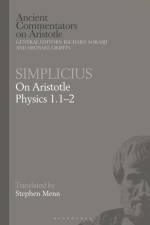av Richard Sorabji
527
With this translation, all 12 volumes of translation of Simplicius' commentary on Aristotle's Physics have been published (full list below). In Physics 1.1-2, Aristotle raises the question of the number and character of the first principles of nature and feels the need to oppose the challenge of the paradoxical Eleatic philosophers who had denied that there could be more than one unchanging thing.This volume, part of the groundbreaking Ancient Commentators on Aristotle series, translates into English for the first time Simplicius' commentary on this selected text, and includes a brief introduction, extensive explanatory notes, indexes and a bibliography.Previous published volumes translating Simplicius' commentary on Aristotle's Physics can all be found in Bloomsbury's series:- On Aristotle Physics 1.3-4, tr. P. Huby and C. C. W. Taylor, 2011- On Aristotle Physics 1.5-9, tr. H. Baltussen, M. Atkinson, M. Share and I. Mueller, 2012- On Aristotle Physics 2, tr. B. Fleet, 1997- On Aristotle Physics 3, tr. J. O. Urmson with P. Lautner, 2001- On Aristotle Physics 4.1-5 and 10-14, tr. J. O. Urmson, 1992- On Aristotle on the Void, tr. J. O. Urmson, 1994 (=Physics 4.6-9; published with Philoponus, On Aristotle Physics 5-8, tr. P. Lettinck)- On Aristotle Physics 5, tr. J. O. Urmson, 1997- On Aristotle Physics 6, tr. D. Konstan, 1989- On Aristotle Physics 7, tr. C. Hagen, 1994- On Aristotle Physics 8.1-5, tr. I. Bodnar, M. Chase and M. Share, 2012- On Aristotle Physics 8.6-10, tr. R. McKirahan, 2001











